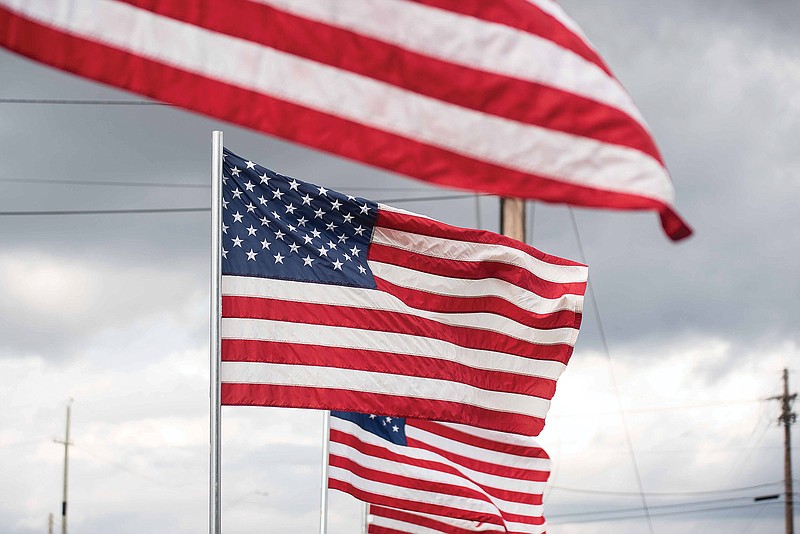TEXARKANA Ark. - While serving in a supply and logistics unit during Operation Desert Storm, former U.S. Army Maj. Sonya Thompson-Mutoke part of her job included getting mail to those serving in combat.
"Back then, (1991) everyone still had paper letters mailed to them because email hadn't been invented yet," she said.
A native of Texarkana, Arkansas, Thompson graduated from Arkansas High School, Class of 1981, before going on to Arkansas State University.
There, she received a U.S. Army officers commission in ASU's Reserve Officer Training Corps as a Second Lieutenant in 1985.
"I went into the university's ROTC during my junior year," she said. "I had a moment to figure out which way to go to get ahead and have a positive impact on my family and my community," she said. "That's when I decided to volunteer to serve. My dad, my brother and a few of my uncles also served in either the Army, the Marine Corps or in the Air Force and that impressed me. I even had a great, great grandfather who served in World War I."
Thompson went on to earned a bachelor's degree in business from ASU in 1986. She also attended Army Airborne School at Ft. Benning Georgia where she received her Airborne Wings as a paratrooper.
"I thought that becoming a paratrooper would enhance my skill sets," she said.
She then entered active service at Ft. Eustis at New Port News, Virginia, in 1987, where she completed the Army's Transportation Officer Basic Course before going on to complete a Junior Officer Maintenance Course at Ft. Knox. Kentucky.
"I had always been interested in logistics, and the junior maintenance course dealt with both vehicle and tank maintenance," she said. "Logistics basically involves everything from ordering the supplies, to getting them where they need to be at the right place and at the right time."
Thompson experienced her first overseas deployment during Operation Desert Storm in the Persian Gulf War of 1991.
"We were there to support the ground forces moving into Kuwait," she said, "We moved tanks in trailers to the front lines."
As for combat, Thompson said she could see the Patriot Missiles being launched to intercept incoming Iraqi SCUD missiles aimed at the the Allied ground support units trying keeping up with the forward moving combat units.
"When the Patriot Missiles took out the SCUDs, you could see what looked like firework in the sky, especially at night." she said.
For Thompson and others moving forward into Kuwait as that country became quickly liberated, the daytime skies soon grew dark from all the black smoke caused by the retreating Iraqi forces, as they attempted to burn Kuwait's oil fields.
"When we moved into Kuwait, the skies were were so dark from all the black smoke it was hard to read the road signs ahead of us," she said."It was almost like night."
Having been initially deployed to the port if Dammam in Saudi Arabia and later to Camp Doha, Kuwait, Thompson said supply vehicles were consistently going back a fourth on a continuous basis until Iraq's forces were in full retreat and out of the area by March of 1991.
"I didn't get much sleep during that time, but we did managed to sleep in vehicles when ever we could," she said.
From a weather and climate standpoint, Thompson said that even in the winter time, it could get to between 90 and 115 degrees in the daytime, but later drop back down to as low as 50 degrees at night.
"The desert sand also got into everything we had and during the sand storms, our mobility was limited because our visibility became limited," she said. "Sometimes it would be hard to see 20 feet in front of you."
The Gulf War ended in early March of 1991, but Thompson remained deployed until November, first as a staff officer and later a company commander.
"We were there for nearly a year so it was good to get back home for a while," she said.
She received a Bronze Star for her service.
Upon her return home from the desert, Thompson went back to Ft. Eustis where she completed a Transportation Officer Advance course before being assigned to the U.S. 37th Transportation Group in Kaiserslautern, Germany. She soon found herself attached to the European Command Team in the former Yugoslavia, which by then had split up into the nations of Bosnia-Herzegovina along with Croatia and Serbia. There, she served as both and air cargo supply drop and Medivac coordinator for the United Nations High Commissioner for Refugees in 1993.
Thompson's job included helping civilian women and children refugees surrounded and cut off by rebel factions in those war-torn countries.
"I helped coordinate transport plane supply drops ( by parachute) of food and medical supplies to non- combatants -mostly women and children civilian refugees'" she said. "For me it was one of the scariest times of my life, because people could be surrounded and cut off by rebel forces. It also got very cold at that time - sometimes below zero. We also had to Medivac injured, wounded and sick civilians out of danger. We would hear gunfire at night and I often saw bodies in the streets. We saw death up close; both women and children would be shot and killed as they were running for food supplies."
For her efforts to aid refugees, Thompson received the Defense Meritorious Medal and completed a second tour in that region as a supply logistics company commander, before being redeployed back to Germany in 1995.
Thompson's last military assignment included being attached to the U.S. Third Army at Ft. McPherson, in Atlanta Georgia. While serving there, Thompson earned a masters degree from Troy State University.
Besides earning both the Bronze Star and the Defense Meritorious Service Medal, Thompson also received the Army Achievement Medal, Army Commendation Medal, Meritorious Army Career Medal, the United Nations Service Badge, Southwest Asia Medal, Kuwaiti Liberation Medal and Overseas Service Badge.
Following her 12 years military service,which ended in 1999, Thompson decided to spent the next 14 years serving the United Nations Headquarters Secretariat in New York City. This included two mission tours to Haiti as the UN's chief transport officer, before she resigned from UN service, to return back to Texarkana, to assist her aging parents.
"Overall, I liked the experience of having a positive impact on my community as well as getting the chance to experience other cultures," she said. "It was also good to have other people experience America by meeting me. It does matter how we behave with each other and treat each other and I value the experience I had with other nationalities, and I hope that I was able to dispel pre-conceive notions about America."


